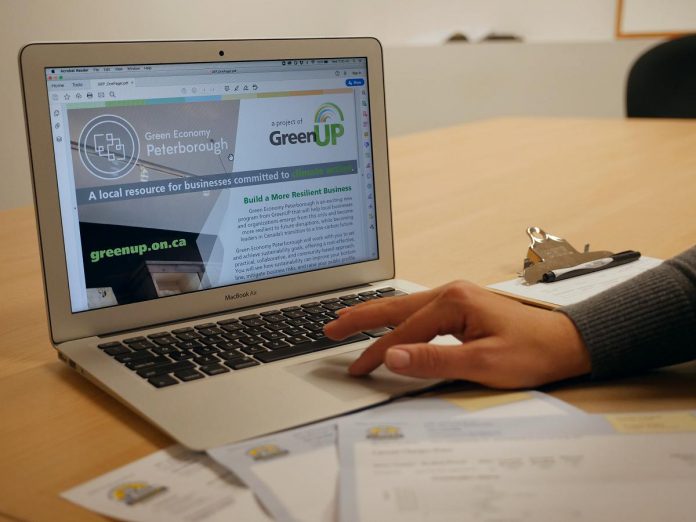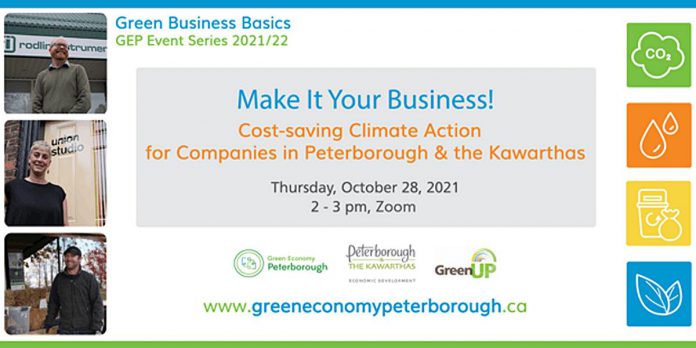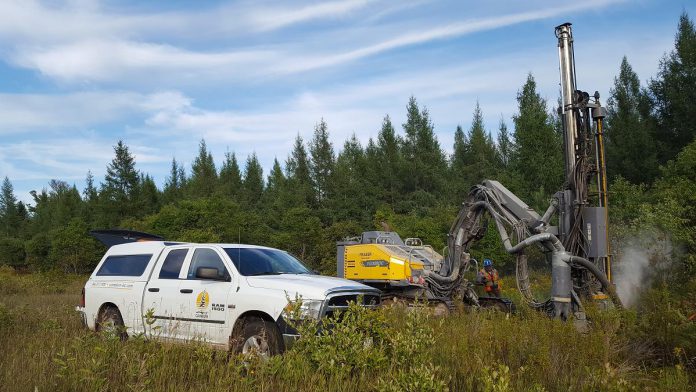
Are you part of a local business and interested in sustainability? Green Economy Peterborough is hosting an event series covering Green Business Basics.
The first of four free events is coming up on Thursday, October 28th. “Make It Your Business! Cost-saving Climate Action for Organizations in Peterborough & the Kawarthas” takes place from 2 to 3 p.m. on Zoom. Visit eventbrite.ca/e/190600460107 to register.
What role to businesses have to play in climate action? There are high costs to all of us if Canadian businesses aren’t inspired and incentivized to mitigate climate change. The City of Peterborough Community Climate Change Resiliency Strategy projected dramatic changes to this region’s climate between 2021 and 2050, including a 20 to 70 per cent increase to winter runoff to rivers, an annual temperature increase of 2.2°C, and a seven per cent increase in precipitation.
In 2019, Peterborough declared a climate emergency and identified the pressing need to reduce 45 per cent of greenhouse gas emissions by 2030. To achieve this target, our entire community must be part of the solution. Meeting our goals will require big contributions from our governments, citizens, and local businesses of all shapes and sizes.
When we asked the 18 founding members of Green Economy Peterborough what drives them to pursue sustainability in their businesses, their top response was they want to “do the right thing” and align with the values of their leadership. The second most common response? They’d like to save money.
Business cases for sustainability can be made, even within a business that is responsible primarily to its shareholders. Reductions in emissions, water, or waste can reduce overall operating costs. Climate action can also result in increased revenue and market share because both suppliers and end users seek out products and businesses that align with their own values.

As corporate sustainability expert Bob Willard explains in his book New Sustainability Advantage:
“If a typical company were to simply implement best-practice sustainability approaches that have already been used by real companies, it could improve its profit by at least 51 per cent to 81 per cent within three to five years, while avoiding a potential 16 per cent to 36 per cent erosion of profits if it were to do nothing.”
Sustainable practices can also increase employee engagement and retention, brand credibility and competitiveness, and risk mitigation.
The introduction of carbon taxation also presents an opportunity for budgeting and planning. The Canadian government, seeking to realign market incentives toward cleaner and greener energy, is set to gradually increase the price of carbon with these measures.
Businesses that make plans now to measure, track, and reduce use of gasoline, natural gas, and other fuels, can position themselves to reduce costs going forward. The sooner they make reductions, or make a switch to cleaner energy, the more they will save in the long term.
Businesses may need support to take on big retrofits or energy efficiency projects. Many businesses need access to funding and incentives that allow them to finance these projects until they see a return on the investment. Programs targeted to helping businesses recoup these costs are available from local utility providers Hydro One (via Save On Energy) and Enbridge Gas.

Fortunately, the banking sector is also beginning to recognize this opportunity. There are a growing number of sustainability-linked loans being rolled out to a broad swath of commercial clients. These loans allow businesses to tie their borrowing costs to their progress on achieving sustainability goals, encouraging them to follow through and report their successes.
Another important key to success for corporations working on sustainability is getting their employees engaged. Empowering a business is, in effect, empowering many individuals to contribute to the effort.
Despite a strong business case for sustainability and the drive to take action, even the most values-aligned business leaders can lack the time, knowledge, or resources to reduce their organization’s environmental impact. Green Economy Peterborough is designed to support these local organizations.
Members of Green Economy Peterborough are guided and supported to measure their impact, make an action plan, and work towards reduction targets. The program encourages members to share best practices and lessons learned, explore emergent business opportunities related to the low-carbon economy, mentor new members, and celebrate success.
Canada has the fourth highest greenhouse gas emissions per capita in the world, and Canada’s business sector is a critical partner in local and global climate action. The first steps in that partnership is supporting effective measurement and incentivizing of reductions in waste and carbon emissions.
If you are part of a local business and interested in sustainability, Green Economy Peterborough is hosting a free event series covering Green Business Basics. The first of the four events, “Make It Your Business! Cost-saving Climate Action for Organizations in Peterborough & the Kawarthas”, is coming up on October 28.

Register for this event — and sign up for the Green Economy Peterborough newsletter to stay informed on local green business happenings — at greeneconomypeterborough.ca or contact Natalie Stephenson, Hub Coordinator, at 705-745-3238 x223 or natalie.stephenson@greenup.on.ca.
Green Economy Peterborough is supported by an advisory committee that includes the City of Peterborough, Peterborough County, Curve Lake First Nation, the Peterborough Downtown Business Improvement Area, Peterborough and the Kawarthas Economic Development, the Greater Peterborough Chamber of Commerce, Three Sisters Natural Landscapes, and Trent University.
Financial support is provided by Green Economy Canada, Natural Resources Canada, Peterborough and the Kawarthas Economic Development, Peterborough County, and TD The Ready Commitment.


























